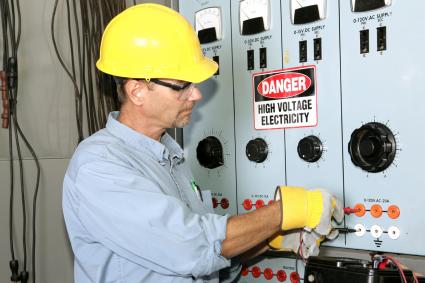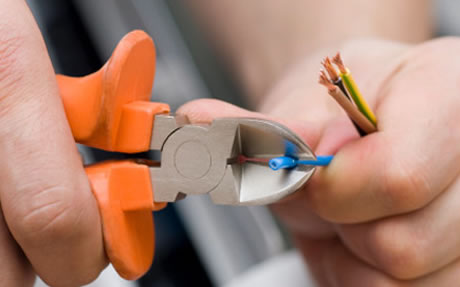Choosing the Right Contractor for Electrical Maintenance
When it comes to maintaining your business’s electricity, choosing a professional contractor is essential. The right contractor brings with them the right knowledge and skills to repair and maintain your office’s electrical systems. So, if you’re running a business or franchise and are in need of an emergency repair or electrical maintenance, read on to make sure you get the right help and services.
WHY YOU NEED AN ELECTRICAL CONTRACTOR
An electrical contractor will be able to identify potential issues, as well as provide ongoing maintenance to ensure that your business’s electrical systems are all running as they’re meant to. An electrical contractor provides a range of services including repairs, installation, inspections, safety testing and preventative maintenance. Modern workplaces bring a degree of difficulty when it comes to electrical maintenance and repair, with strata units having advanced systems and wiring requiring an expert electrical contractor. Master electricians are your safest option for electrical maintenance on your business or franchise, since they generally have both the electrical experience and the business know-how to ensure the best service, keeping the efficiency and successful running of your business in mind.
WHAT TO CONSIDER WHEN CHOOSING A CONTRACTOR
There are many ways of finding an electrical contractor, along with many considerations to make when choosing the right one. You will need to find a trustworthy and competent electrician who can meet your expectations. The first thing to consider is the purpose of requiring a contractor. Are you planning on renovating or refitting an office? Are you installing a new security system? Or is there an emergency repair that requires prompt attention?
With a clear task in mind, you can then narrow your search down to respected electrical contractors in your area who have experience with commercial building and fittings. You will then have to inform the contractor with details of your project, as well as time or budget restraints. Remember to be realistic when it comes to these, since some jobs may require more work than others. While many electrical contractors are able to finish projects that normally take 6 months in less than 3 months, the contractor must be informed of any deadline so that they can do what they can to meet it.

Five Skills Every Electrician and Electrical Technician Needs
Although this career route may be attractive to a lot of people, there are some electrical technician requirements that can’t be taught in a classroom or during an apprenticeship. It’s important to consider whether you have the following skills necessary to be good at the job, otherwise your safety and the safety of those around you may be in jeopardy:
1. Mechanical aptitude.
It might seem obvious, but not everyone has an innate sense of mechanics. If you’ve always enjoyed taking things apart to see how they work and are successfully able to put them back together, electrical work might be a good fit. On the other hand, if a simple do-it-yourself project leaves you frustrated, this might not be the right career path for you. Being comfortable around electrical work and being confident in your own abilities is a must.
2. Problem-solving skills.
Diagnosing and repairing electrical problems is a large part of a technician’s job. Once the apprenticeship is over, you will be largely on your own to respond to issues and find their solution. Understanding an overall electrical problem and investigating ways to fix it is a critical component of this job. Learning how to identify the relative strengths and weaknesses of alternative solutions to problems is another vital skill for a successful career as an electrical technician.
3. Reading comprehension.
Many work orders are assigned to electricians through written communications, either on paper or through email. Interpreting these work orders and writing a summary of your own work are important components to ensure job details are followed properly and so other electricians can understand your methods should they work on the project after you.
4. Business skills.
Since many electrical technicians go on to become independent contractors, business skills are something you can acquire over the years. A general knowledge of business practices, such as invoicing, tracking inventory, managing employees and strategic planning will help many electrical technicians make the jump to supervisory positions and, hopefully one day, running their own companies.
5. Customer service skills.
The amount of interaction an electrician has with customers varies greatly depending on their type of position. If you work for a large company and spend most of your time servicing machinery within that company, you might not come in contact with many direct customers.

THINGS TO LOOK FOR WHEN CHOOSING AN ELECTRICIAN
When having any sort of work done around our home, we always want to make sure we get quality work done at the right price. Choosing a tradesman can be difficult if you don’t know what to look for. Below are the top 5 things to look for when choosing an electrician.
LICENSE AND INSURANCE
The most important factor to consider when choosing an electrician is whether they are licensed. A license is your guarantee that the contractor has done the necessary courses and practical work to perform the job safely and correctly. Always ask to see their license, make sure that it is current and do an online check if possible. Make sure that the license held covers the type of work you need done. Some electrical licenses may carry restrictions. It is also important to make sure the electrician carries all the necessary insurances. Ask to see copies of current policies and make sure they have not expired.
VALUE FOR MONEY
It is a good idea to get at least 3 quotes, in fact the more the better. Always make sure you communicate exactly what work you require and the exact fittings and materials you would like to use. Make sure the electrician gives you a quote with a breakdown of prices as this will make it easier to compare one quote to another. Choosing an electrical contractor on price alone is unwise as there are other important things to consider.
When having any sort of work done around our home, we always want to make sure we get quality work done at the right price. Choosing a tradesman can be difficult if you don’t know what to look for. Below are the top 4 things to look for when choosing an electrician.
LICENSE AND INSURANCE
The most important factor to consider when choosing an electrician is whether they are licensed. A license is your guarantee that the contractor has done the necessary courses and practical work to perform the job safely and correctly. Always ask to see their license, make sure that it is current and do an online check if possible. Make sure that the license held covers the type of work you need done. Some electrical licenses may carry restrictions. It is also important to make sure the electrician carries all the necessary insurances. Ask to see copies of current policies and make sure they have not expired.
VALUE FOR MONEY
It is a good idea to get at least 3 quotes, in fact the more the better. Always make sure you communicate exactly what work you require and the exact fittings and materials you would like to use. Make sure the electrician gives you a quote with a breakdown of prices as this will make it easier to compare one quote to another. Choosing an electrical contractor on price alone is unwise as there are other important things to consider.
QUALIFICATIONS AND EXPERIENCE
Not all electricians are the same, many will have extra qualifications or experience in different areas of electrical work, and some may even have accreditations. Choosing a Master Electrician gives a guarantee that the electrician has at least 3 years experience and must offer a 12 month warranty on workmanship. Using a Master Electrician will ensure you receive the highest standard of workmanship and electrical safety. With the skyrocketing cost of electricity, energy efficiency is likely to be of interest. There are several organizations offering accreditation in the field of energy efficiency. An electrician holding this type of accreditation should have an extensive knowledge of energy saving products and technology.
ATTITUDE AND COMMUNICATION
Nobody enjoys dealing with a tradesman who displays a bad attitude or sloppy workmanship. Take note if they arrive for the quote on time or, if they are held up, did they ring ahead and advise that they would be delayed? Do they communicate with you? You need to be confident that you understand each other so that there are no miscommunications during the project. A professional appearance and attitude is usually reflected in the quality of the workmanship provided.

What Are the Most Important Safety Concerns for Electricians?
Interviewers who ask this question want to see that you are safety-minded. They want to see that you have a good understanding of the risks associated with this type of work and get a sense of how concerned you are about safety in the way you approach your work.
Answer examples include:
- You are most concerned about fatal electrical shock.
- The second is electrical/thermal burns, possible electrical fires.
- There are other things you have to monitor such as lead exposure and the possible dangers during welding.
- You’re aware of the dangers of working around machinery and equipment so you don’t slip or fall.
- Some work requires you to be in tight spots, even contorted positions to reach areas needing repair, so you’re always on guard against accidental mishaps or muscles strains.
How to Verify an Electrician’s License
You should always hire a licensed professional for electrical work around the home.
Aside from the danger that goes along with any residential electrical project, faulty electrical work can lead to fires, and your homeowners’ insurance may not cover damages caused by unlicensed electrical work.
Why is a license important?
Electrical work requires training. In many cases, a journeyman electrician must complete five years of education and 10,000 hours of on-the-job training. Electrical training is the longest program in apprenticeship work. Electricians are taught how to safely work with electrical systems, as well as local laws and codes.
Building codes can vary by state or community. The National Electrical Code is the minimum standard for electrical work in most states. The code receives updates every three years. A licensed electrician will know the code requirements for your area, and whether it requires a permit.
Tips for verifying a license
There are three types of information that you can use to verify a license. You can use the number that appears on the license. You can get the information using the electrician’s full name. Verification can also be performed by the company’s name.
While each state has different requirements and licensing organizations, your local licensing department can verify if an electrician is licensed to work in your community. Your state’s Department of Labor should also be able to offer this information.